
From Lewis Dartnell, Sunday Times bestselling author of The Knowledge, a book that takes us back through time to explore how the Earth itself has directed the human story.
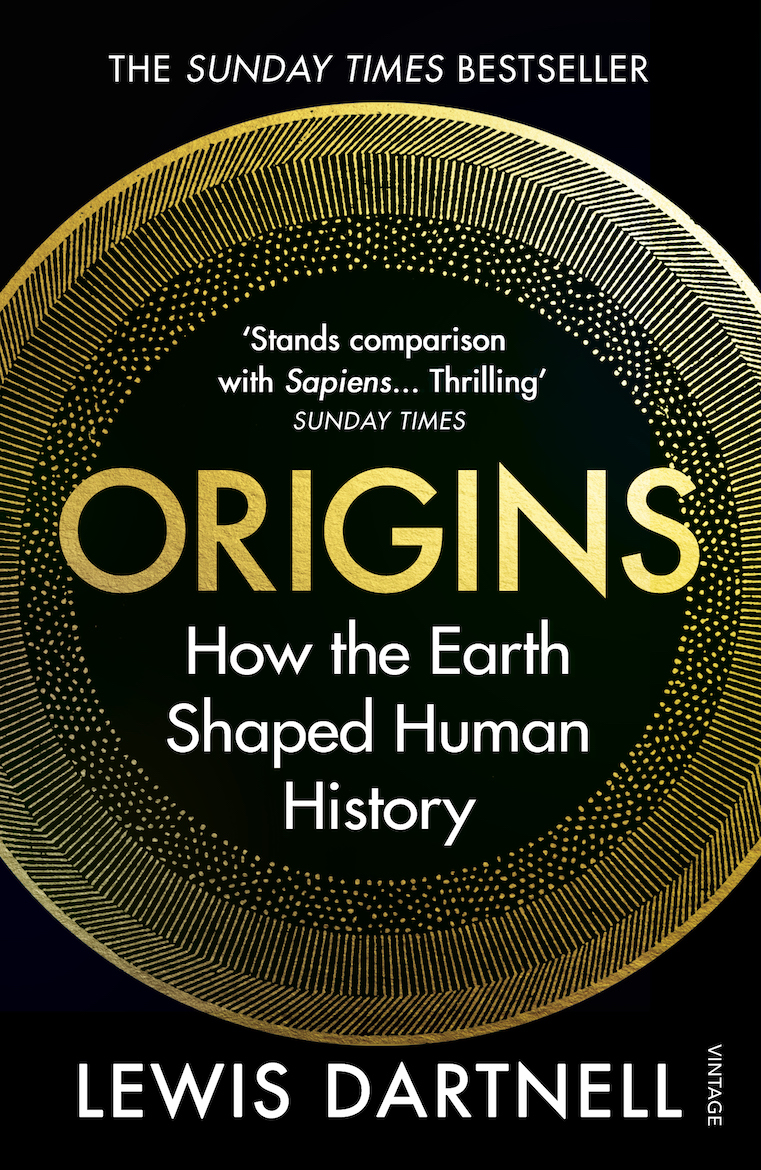
When we talk about human history, we focus on great leaders, revolutions, and technological advances. But how has the Earth itself determined our destiny? How has our planet made us?
As a species we are shaped by our environment. Geological forces drove our evolution in East Africa; mountainous terrain led to the development of democracy in Greece; and today voting behaviour in the United States follows the bed of an ancient sea. The human story is the story of these forces, from plate tectonics and climate change, to atmospheric circulation and ocean currents.
How are the Himalayas linked to the orbit of the Earth, and to the formation of the British Isles? By taking us billions of years into our planet’s past, Professor Lewis Dartnell tells us the ultimate origin story. When we reach the point where history becomes science we see a vast web of connections that underwrites our modern world and helps us face the challenges of the future.
From the cultivation of the first crops to the founding of modern states, Origins reveals the Earth’s awesome impact on the shape of human civilisations.
- Sunday Times top History book
- Waterstones ‘Best of 2019’ book
- iNews 11 best popular science books for 2019
- Mail on Sunday recommended Science and Nature book for summer reads
- Book of the Week, The Times
- Book of the Week, Evening Standard
- Book of the Month, BBC Sky at Night magazine
OUT NOW in Paperback:
Hardback:
*** Come see me speak live about the book at one of the tour events ***
Beyond the UK and USA editions (as well as Braille available from the RNIB), ORIGINS is available in the following 25 translations (publisher):
| Bulgaria (Iztok-Zapad) |
China [simplified] (Fantasee Media) |
| Croatia (Planetopija) |
Denmark (Klim) |
| France (JC Lattes) |
Germany (Hanser) |
| Greece (Patakis) |
Hungary (Akkord) |
| Iran (Persian) |
Italy (Il Saggiatore) |
| Japan (Kawade Shobo) |
Lithuania (Alma Littera) |
| Netherlands (Thomas Rap) |
Poland (Zysk) |
| Portugal (Planeta) |
Romania (Litera) |
| Russia (AST) |
Serbia (Laguna) |
| Slovakia (Premedia Group) |
Slovenia (UMco) |
| South Korea (Next Wave) |
Spain (Debate) |
| Sweden (Volante) |
Turkey (Can Yayinlari) |
| Ukraine (Nash Format) |
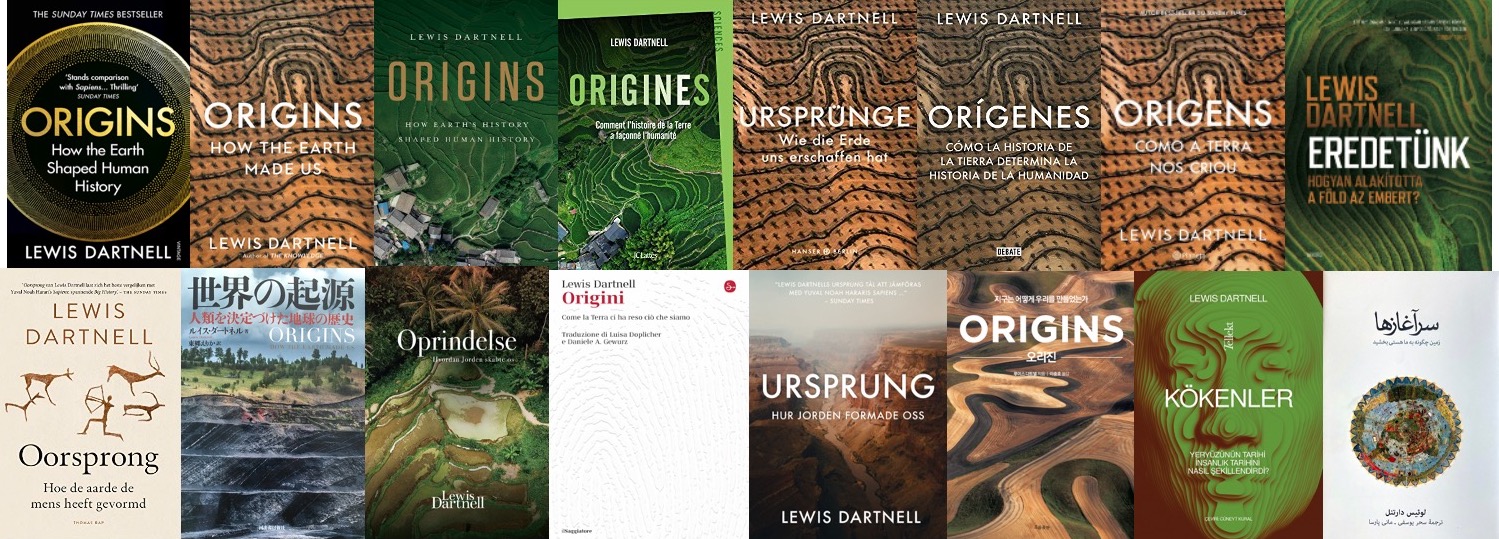
“Origins is one of those rare books that dissolves mystery through the steady application of sublime lucidity… Dartnell understands geology, geography, anthropology, physics, chemistry, biology, astronomy and history. That’s quite an achievement, but what makes him special is the way he communicates the interconnectedness of these disciplines in a clear, logical and entertaining way… Superb.”
THE TIMES, Book of the Week
“An excitingly grand argument driven by delight in detail. This thrilling look at how geography shaped us stands comparison with Harari’s ‘Sapiens'”
THE SUNDAY TIMES
“Dartnell’s story is beautifully written and organized. His infectious curiosity and enthusiasm tug the reader from page to page, synthesizing geology, oceanography, meteorology, geography, palaeontology, archaeology and political history in a manner that recalls Jared Diamond’s classic 1997 book Guns, Germs, and Steel.”
NATURE
“Dartnell has found the perfect blend of science and history. This is a book that will not only challenge our preconceptions about the past, but should make us think very carefully about humanity’s future”
Simon Griffiths, MAIL ON SUNDAY
“Dartnell is an eloquent, conversational guide to these daunting aeons of time. Never has geological history seemed so current.”
THE GUARDIAN
“Dartnell’s approach is encyclopedic, marked by both a broad sweep and a passion for details.”
WASHINGTON POST
An “absorbing account of the planetary processes that have shaped humanity… Stimulating, entertaining stuff. Dartnell has an easy, light touch that mixes well with his considerable knowledge of our planet’s geological history”
OBSERVER
“A sweeping, brilliant overview of the history of not only of our species but of the world. Whether discussing the formation of continents or the role that climate (and climate change) has had on human migration, Lewis Dartnell has a rare talent in being able to see the big picture – and explaining why it matters.”
Peter Frankopan, Author of The Silk Roads
“An original and timely way of looking at human history through the materials and natural resources that our species has employed to such effect. It should be read by everyone who ponders how long exploitation can continue on a finite planet”
Richard Fortey, author of The Earth: An Intimate History
“Endlessly enthralling, Lewis Dartnell explains why the history of humanity, and of human cultures, both take dictation from the deeper history of Earth herself – from broad generalities to surprisingly specific details. An entertaining and informative essay on contingency – and worthy successor to the writing of Stephen Jay Gould”
Ted Neild, author of Supercontinent
“What a treat to see history through the eyes of an astrobiologist! Lewis Dartnell’s absorbing new book shows, with many vivid examples, how deeply human history is embedded in the history of planet earth.”
David Christian, author of Big History
OUT NOW in Paperback:
Hardback:
Book tour events
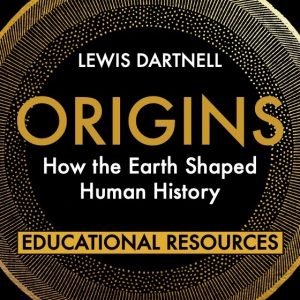
Teachers’ educational resources
I have created a dedicated site containing educational resources for teachers based on the research and material within ORIGINS. Please explore www.teachers.originsbook.com
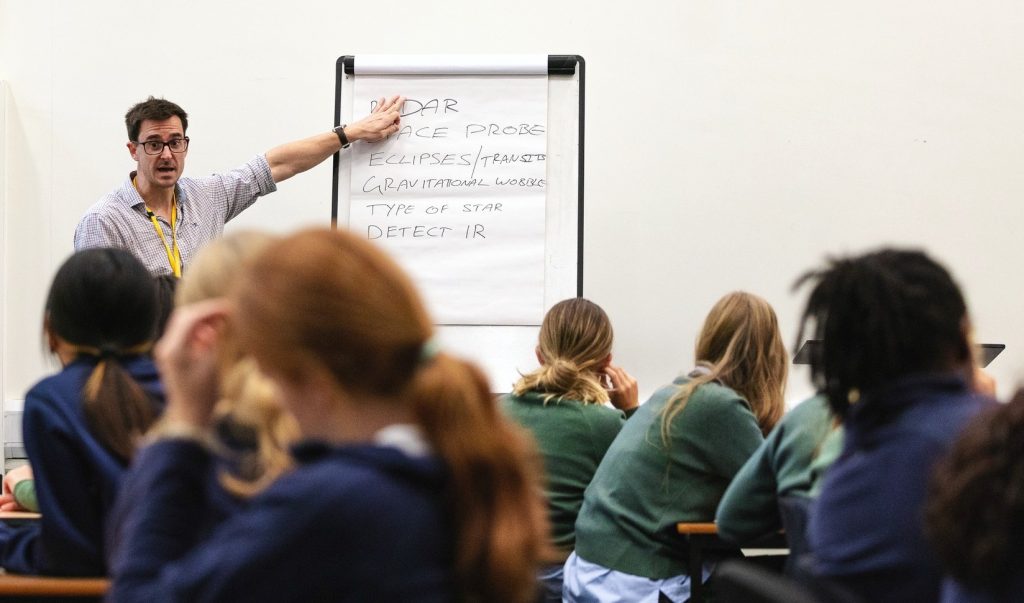
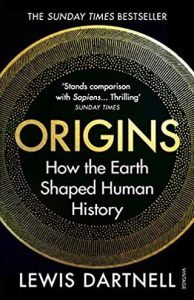 When we talk about human history, we focus on great leaders, revolutions, and technological advances. But how has the Earth itself determined our destiny? How has our planet made us?
When we talk about human history, we focus on great leaders, revolutions, and technological advances. But how has the Earth itself determined our destiny? How has our planet made us?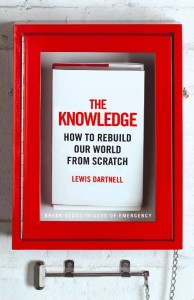 Maybe it was an asteroid impact, a nuclear war, or a viral pandemic. Whatever the cause, the world as we know it has ended and you and your community of survivors must start again. What key knowledge would you need to not only survive in the immediate post-apocalyptic aftermath, but avert another Dark Ages and accelerate the rebooting of civilisation from scratch? Living in the modern world, we have become disconnected from the basic processes that support our lives, as well as the beautiful fundamentals of science that enable you to relearn things for yourself. The Knowledge is a grand thought experiment on the behind-the-scenes fundamentals of how our world works, and what drove the progression of civilisation over the centuries.
Maybe it was an asteroid impact, a nuclear war, or a viral pandemic. Whatever the cause, the world as we know it has ended and you and your community of survivors must start again. What key knowledge would you need to not only survive in the immediate post-apocalyptic aftermath, but avert another Dark Ages and accelerate the rebooting of civilisation from scratch? Living in the modern world, we have become disconnected from the basic processes that support our lives, as well as the beautiful fundamentals of science that enable you to relearn things for yourself. The Knowledge is a grand thought experiment on the behind-the-scenes fundamentals of how our world works, and what drove the progression of civilisation over the centuries.



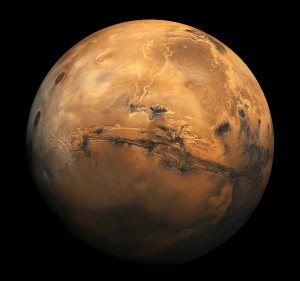
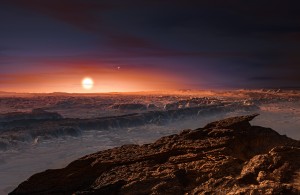
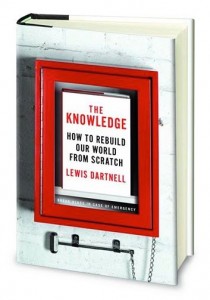 Maybe an asteroid hit Earth. Perhaps a nuclear war reduced our cities to radioactive rubble. Or avian flu killed most of the population. Whatever the cause, the world as we know it has ended and now the survivors must start again. But how do we set about rebuilding our world from scratch?
Maybe an asteroid hit Earth. Perhaps a nuclear war reduced our cities to radioactive rubble. Or avian flu killed most of the population. Whatever the cause, the world as we know it has ended and now the survivors must start again. But how do we set about rebuilding our world from scratch?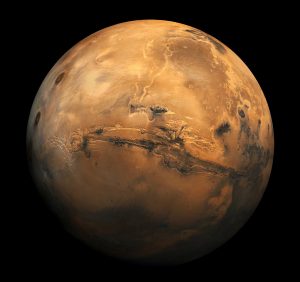 Astrobiology is a brand new field of science, encompassing research into the origins and limits of life on our own planet, and where life might exist beyond the Earth. But what actually is ‘life’ and how did it emerge on our own world? What are the most extreme conditions terrestrial life can tolerate? And what would an alien actually look like – how realistic are the life-forms envisaged by science fiction novels and films over the years? Join Dr. Lewis Dartnell on a tour of the other planets and moons in our solar system which may harbour life, and even further afield to alien worlds orbiting distant stars, to explore one of the greatest questions ever asked: are we alone…?
Astrobiology is a brand new field of science, encompassing research into the origins and limits of life on our own planet, and where life might exist beyond the Earth. But what actually is ‘life’ and how did it emerge on our own world? What are the most extreme conditions terrestrial life can tolerate? And what would an alien actually look like – how realistic are the life-forms envisaged by science fiction novels and films over the years? Join Dr. Lewis Dartnell on a tour of the other planets and moons in our solar system which may harbour life, and even further afield to alien worlds orbiting distant stars, to explore one of the greatest questions ever asked: are we alone…?